Worth a total of INR 2274.2 Cr, the two penalties mark the end of two major investigations that the CCI was conducting against the Silicon Valley giant
Apart from Google, Amazon and Meta are under investigation for anti-competition behaviour
Here is a deep dive into what brought about some of the biggest fines in India’s tech landscape on Google
India’s antitrust watchdog, the Competition Commission of India (CCI) slapped two penalties on Google in less than a week.
Worth a total of INR 2,274.2 Cr ($276.37 Mn), the two penalties come as Big Tech is under increased scrutiny in India. Both the rulings came under different cases and warrant a review of what has happened so far.
Case One: Google’s Abuse Of Dominant Position In The Android Market
After Google acquired Android Inc in July 2005 (the original creators of the Android OS), it seems that Google has an edge over other operating systems, virtually being a part of every phone.
Google has entered into several agreements with OEMs, forcing them to install Google Mobile Services (GMS) and give the tech major preferential access to users. These agreements then stem out into various Android ecosystem markets which it dominates.
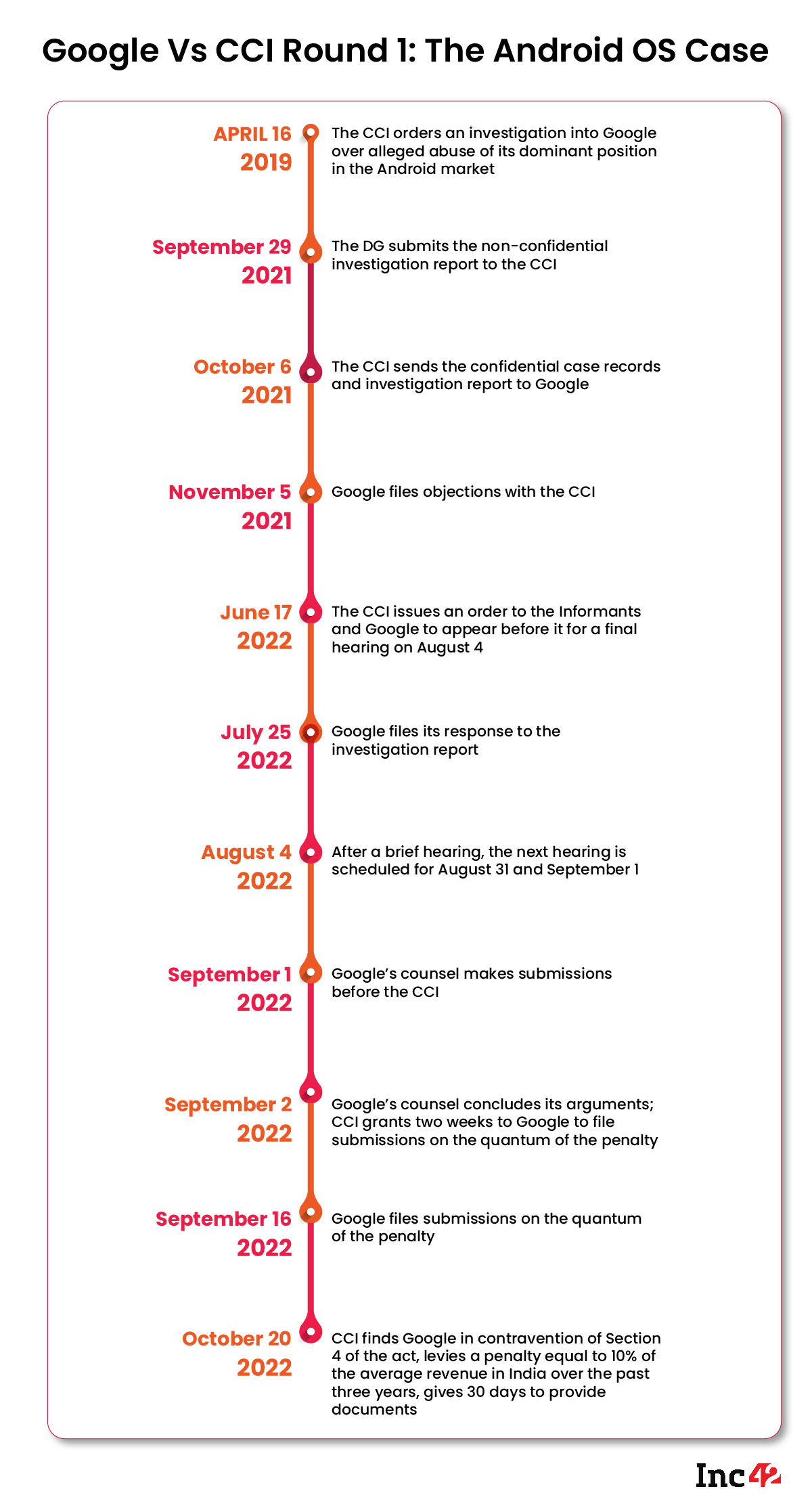
In the 293-page order issued by the CCI on October 20, the antitrust watchdog delineated five markets Google catered to with its product to conduct the investigation:
- Licensable OS for smart mobile devices in India
- App stores market for Android in India
- General web search services in India
- Non-OS-specific mobile web browsers in India
- Online video hosting platforms (OVHPs) in India.
The watchdog concluded that in all five markets, it took deliberate measures to consolidate its dominant position and suppress competition.
Licensable OS Market: Google enters into multiple agreements with the OEMs. The agreements OEMs sign are as follows:
- Mobile Application Distribution Agreement (MADA)
- Anti-Fragmentation Agreement (AFA)/Android Compatibility Commitment (ACC)
- Revenue Sharing Agreement (RSA)
- Mobile Service Distribution/Placement Bonus Agreement
The agreements entail several conditions that the CCI concluded gave Google a competitive edge over other players in the market.
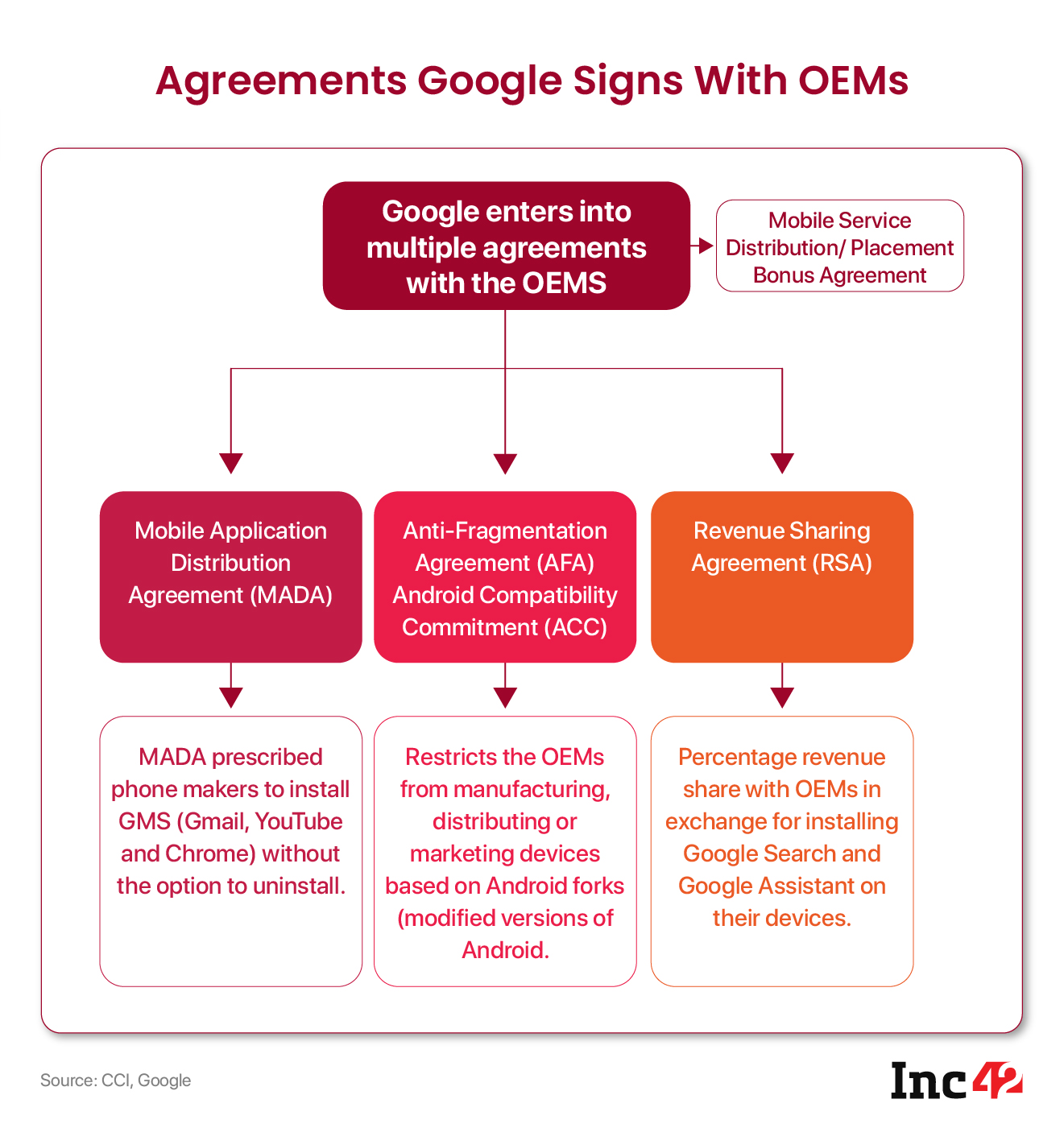
“It [Google] compels OEMs to sign MADA with Google, even if unwillingly,” said the CCI. It noted that the mandatory pre-installation of the entire GMS suite under MADA is in contravention of the provisions of Section 4(2)(a)(i).
The obligations for the OEMs under other agreements were also found to be in contravention of Section 4(2)(d) of the Act. Further, the watchdog concluded that Google’s conduct regarding Android forks violated Section 4(2)(b)(ii) of the Act.
App Stores Market: According to the investigation conducted by the CCI, Google’s dominance and conduct resulted in entry barriers for other app stores.
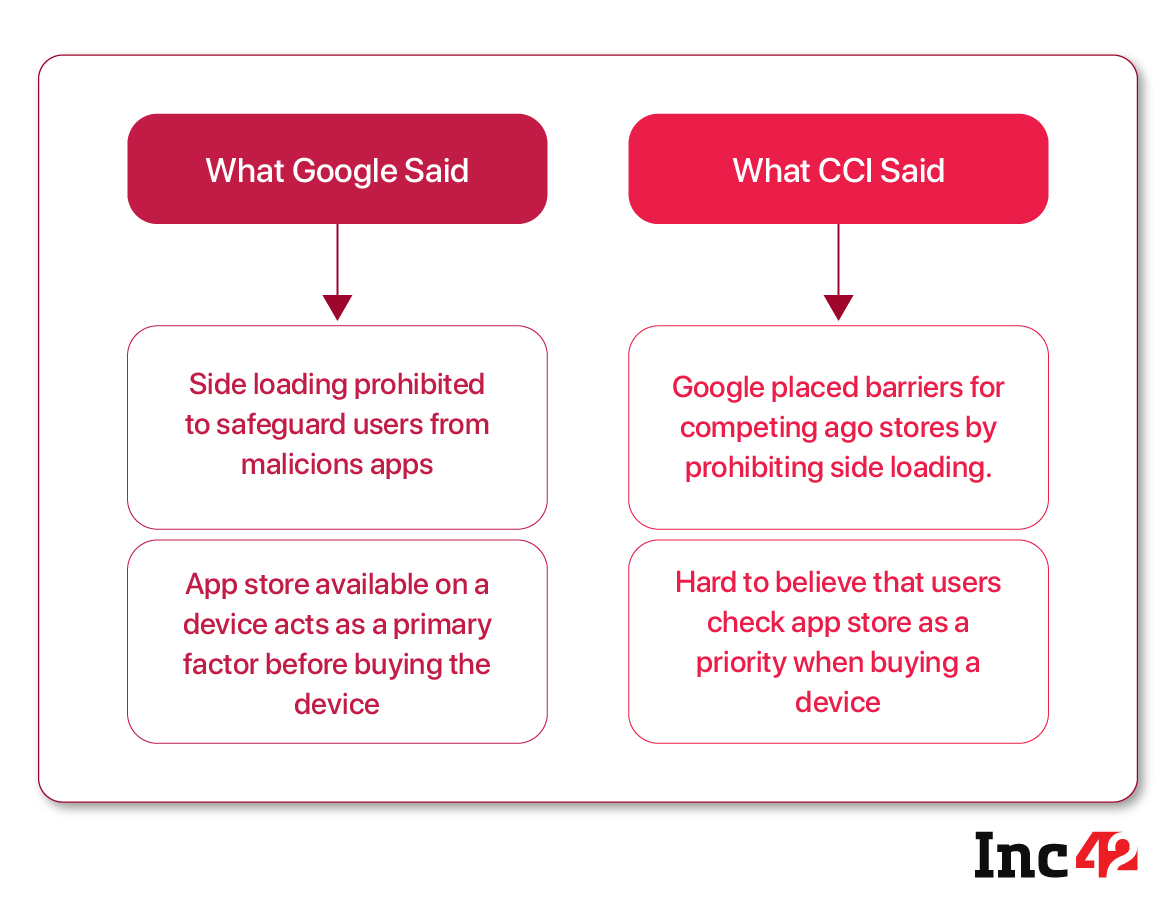
Even though Google contested that installing Play Store is not a necessity, several OEMs submitted that they have to install Play Store to avoid negative customer feedback and to fulfil their obligations to Google.
“Google has leveraged its dominant position in the app store market for Android OS to protect its position in online general search in contravention of Section 4(2)(e) of the Act,” the CCI concluded.
General Web Searches: According to the CCI, the tech giant has also been dominant in the general search market for a long time, which helps it generate huge revenue.
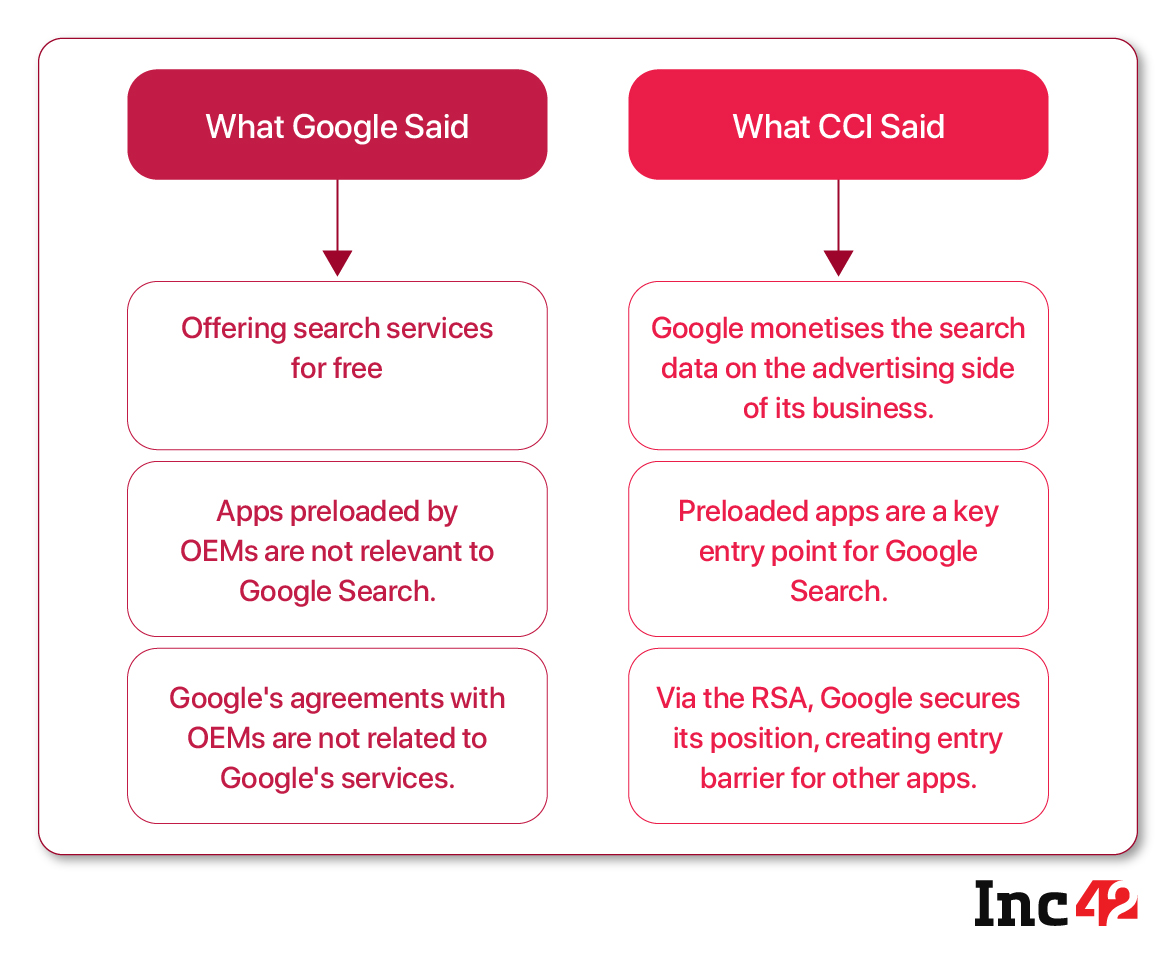
The watchdog also cited that users did not download competitor apps to Google’s suite of applications due to the status-quo bias. The CCI concluded that Google left little space for competitors to enter the market.
The antitrust watchdog further concluded that Google’s dominant position denied market access to competing search apps in violation of Section 4(2)(c) of the Act. The tech major also leveraged its dominant position in Play Store to protect its dominant position in the general web search market in contravention of Section 4(2)(e) of the Act.
Non-OS-Specific Mobile Web Browsers: The non-OS-specific browsers are available for both Android and iOS. A few examples include Google Chrome, Mozilla Firefox and Microsoft Edge.
In every Android device, Google Chrome comes as a preinstalled, uninstallable app. The CCI said that a user was unlikely to use any other browser apart from Chrome, creating an entry barrier for other non-OS-specific browsers. Amazon, Samsung, Xiaomi, Microsoft, Mozilla, Yandex and UC Web also submitted the same reasoning before the CCI.
Google offered little resistance in this segment, leading the CCI to find it in violation of Section 4(2)(e) of the act for leveraging its dominant position in the app store market to secure its position in the non-OS-specific market.
Online Video Hosting Platform: The watchdog’s findings noted that YouTube had the largest market share among all of its competitors. Further, it was also a preinstalled app on all Android devices, giving it a competitive edge over others.
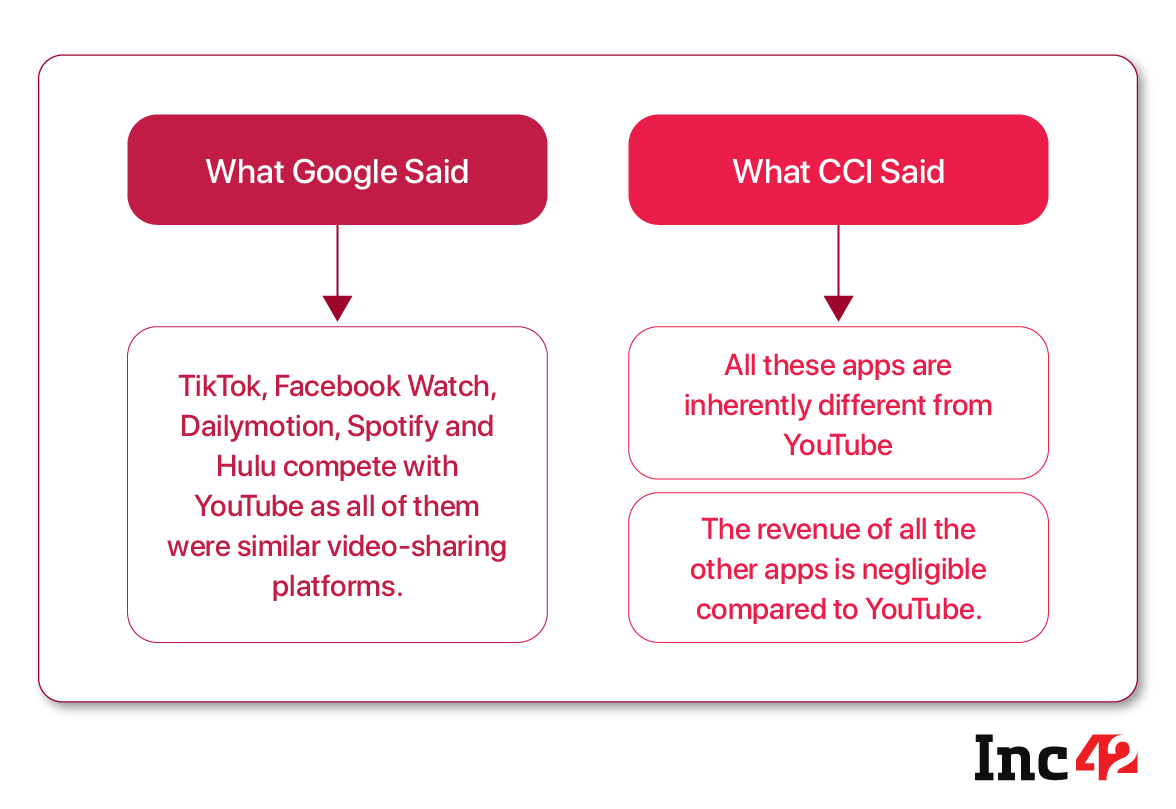
“Google has leveraged its dominant position in the app store market for Android OS to enter as well as protect its position in OVHPs market through YouTube and thereby contravened provisions of Section 4(2)(e) of the Act,” the CCI said.
The Order: According to the order, Google’s agreements operated in tandem, with the interplay between those apps resulting in many anti-competitive outcomes. Imposing a cease and desist order, the CCI suggested some measures to correct the tech giant’s conduct in the market. Some of the suggestions include:
- Give OEMs a choice on GMS apps to install and choose the placement of these apps
- Licence Play Store without the requirement of installing GMS apps
- Provide access to Play Services APIs to everyone
- Stop offering monetary incentives to OEMs for the exclusivity of search services
- Stop imposing AFA/ACC agreements on OEMs
- Allow users to uninstall pre-installed Google apps
- Allow app store developers to distribute their app stores via the Play Store
- Allow app developers to distribute apps through side loading
The CCI imposed a penalty worth 10% of the average revenue of Google in India over the last three years, or INR 1,337.76 Cr.
Case Two: Google’s Anti-Competitive Play Store Policies
The second case was related to Google’s alleged abuse of dominance within the tech major’s Play Store policies. By enforcing the Google Play Billing Service (GPBS) on app developers, the tech giant flouted several provisions of Sector 4 of the Competition Act, the CCI said.
The informants alleged that Google used its dominant position in licensable mobile OS and app stores markets to force app developers to include Google Play in-app billing system. Further, Google prioritised Google Pay for in-app purchases (IAPs) over other UPI apps.
The case was first filed on February 21, 2020, by an anonymous informant. The CCI ordered an investigation into Google’s Play Store policies in November 2020.
In its investigation, the DG delineated three markets in which Google was noted to be dominant and subsequent investigation revealed that the tech major not only gained an unfair advantage but also abused its dominance to deny entry to competitors.
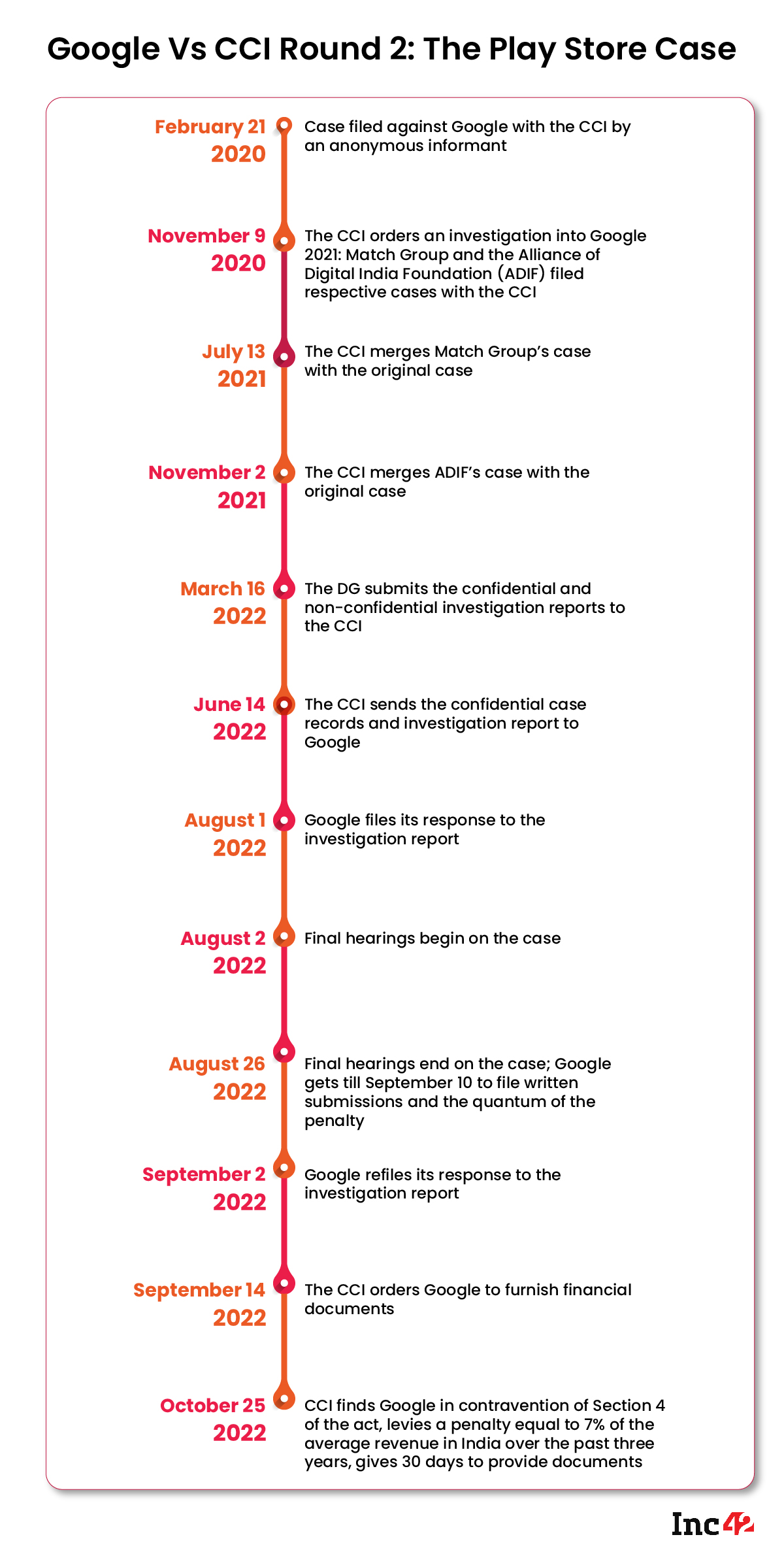
The CCI raised three major issues regarding the Google Play Billing System (GPBS) – charging of commission, exclusion of other UPI apps, and pre-installation of Google Pay on devices.
Google’s Conduct With App Developers: It is prudent to mention that Google has not only been mandating a “take it or leave it” policy with app developers on in-app purchases (IAPs) but also charging up to 30% commission from the said IAPs.
The watchdog noted that an app developer had to sign several agreements with the tech major:
- Developer Distribution Agreement (DDA)
- Developer Program Policies (DPP)
- Google Payments Terms of Service-Seller (IN) (for IAPs)
- The use of Google Play Billing System (GPBS)
The CCI concluded that the app developers were compulsorily required to use GPBS for IAPs and app sales. The watchdog also noted that Google charged unfair fees to app developers under its agreements.
The US-based tech major submitted that 97% of the app developers in India were charged a nominal fee of $25 to list their apps on the Play Store. It added that even from the remaining 3%, 99% were eligible for service fees of 15% or less.
Google argued that it charged the service fees to provide various facilities to app developers, including hosting, discovery, infrastructure, compliance and development.
The CCI noted that as per Google’s submissions, the paid apps and the IAPs paid for the services that all the app developers received. This contradicted the tech major’s impartiality argument and CCI rejected the claim.
Further, even though Google said all the apps were subject to GPBS, it omitted its own app suite from the commission requirements. ShareChat submitted that the commission prescribed under the GPBS did not apply to YouTube.
The CCI concluded that Google put competitors at a disadvantage by charging high fees from the competing apps and not charging from its apps, having control over the data, and delaying the payments to app developers.
As such, the watchdog said the tech giant violated Section 4(2)(a)(i), Section 4(2)(a)(ii), Section 4(2)(b)(ii), Section 4(2)(c) and Section 4(2)(e) of the Act.
Other UPI Apps Excluded From IAPs: The mandatory use of GPBS meant that other payment apps were denied market access to the IAPs, the CCI added.
The fairtrade regulator also discovered that Google Pay was integrated with intent flow methodology while other UPI apps were being used via collect flow methodology. The former is more user-friendly as it includes fewer steps.
However, Google noted that the CCI’s investigation report failed to show how integrating other UPI apps with collect flow methodology was discriminatory. The tech giant added that it remained in line with NPCI requirements and was not required to prefer any methodology.
The CCI countered that Google’s argument was undermined by the evidence provided on record, thus removing the need to show anything more. On the NPCI guidelines, the watchdog noted that the guidelines did not restrict Google from integrating all UPI apps using intent flow methodology.
“The Commission holds Google to be in violation of Sections 4(2)(a)(ii), 4(2)(c) and 4(2)(e) of the Act,” the order read. CCI also said Google violated Sections 4(2)(a)(ii), 4(2)(c) and 4(2)(e) of the Act by pre-installing Google Pay.
The Order: The CCI found the tech major violating several provisions of Section 4 of the Competition Act. Apart from the penalty, the watchdog directed Google to cease and desist from indulging in anti-competitive practices. Some of the measures suggested by CCI are:
- Allow app developers to use third-party billing services
- Avoid imposing anti-steering provisions on app developers for payments
- Set out a clear and transparent data collection policy on the platform, including the potential usage and sharing of the said data
- Avoid imposing unfair pricing conditions on app developers
- Transparent communication to app developers regarding service fees and other related charges
Under Section 27(b) of the Competition Act, the CCI imposed a penalty worth 7% of the average revenue of Google in India over the last three years, or INR 936.44 Cr.
Tough Times For Google In India
India is one of the biggest markets for the tech major. Therefore, it can’t afford to be on the wrong side of the law of the land. Since there is a 30-day timeline for Google to respond, it can either move to a court or answer pending CCI questions and pay up.
The former would invite a rehearing of the cases, the latter might see Google’s penalties reduced significantly.
According to the orders, when the US-based company produces its updated financials, the penalties would change substantially.
This is the first time Google has received a punishment like this in India. However, it has been fighting antitrust lawsuits across the world.
Recently, the European Union (EU) also fined the tech giant a whopping $4.2 Bn (INR 34,605 Cr) on similar charges of abusing its dominant market position. For context, India has imposed a penalty worth 4% of the EU fine.
On Thursday (October 27), the Union Minister of Electronics and IT Ashwini Vaishnaw called the penalties a ‘good move’, clarifying where the government stood on the matter. Reports also said that Google was prepared to take the CCI to court over the rulings; Google has taken the EU to court as well.
Currently, the antitrust watchdog is also conducting a third investigation into Google’s revenue-sharing practices with digital news publishers. The CCI recently ordered a probe into the tech major’s alleged abuse of dominance in the news aggregators space.




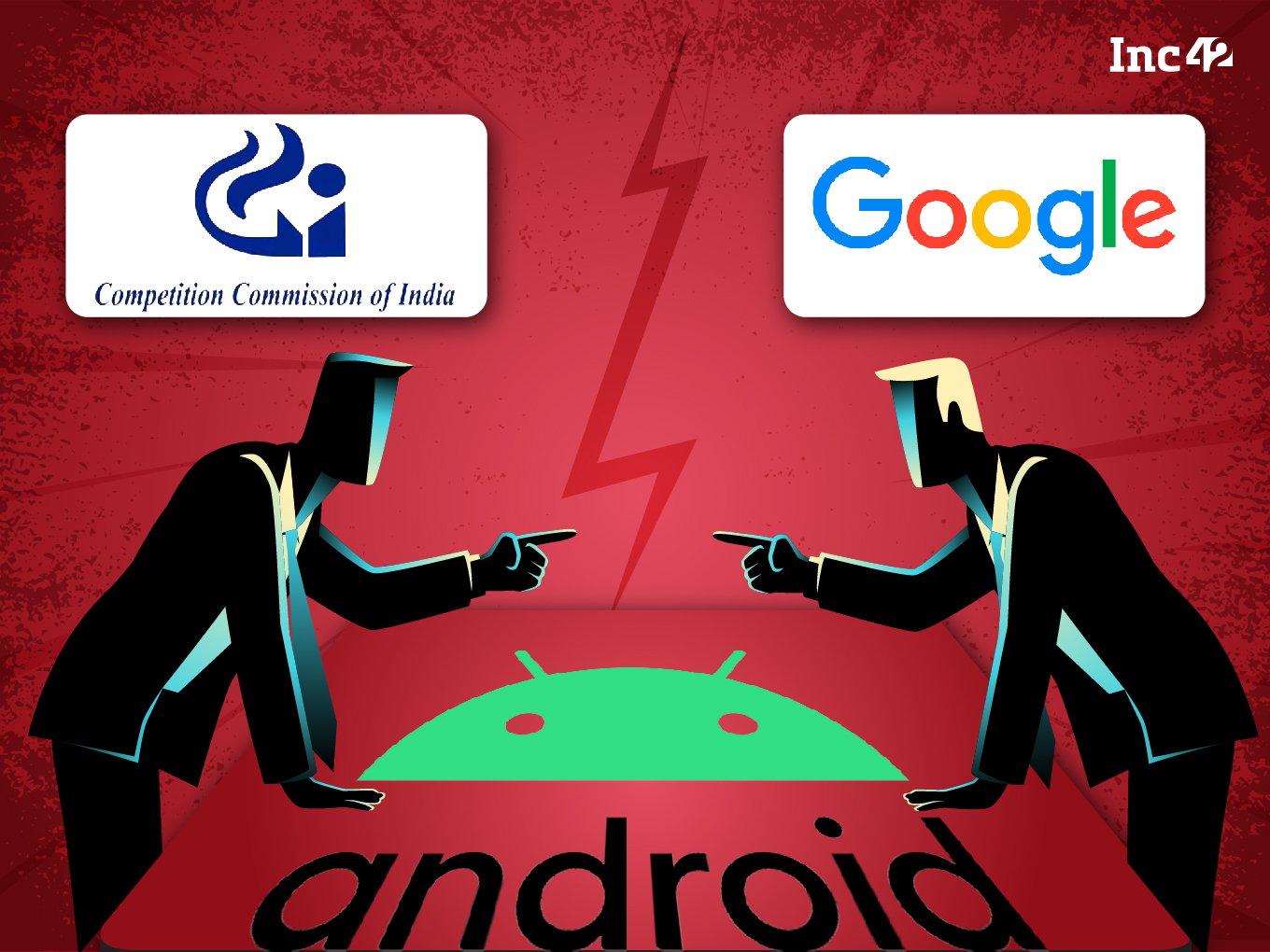






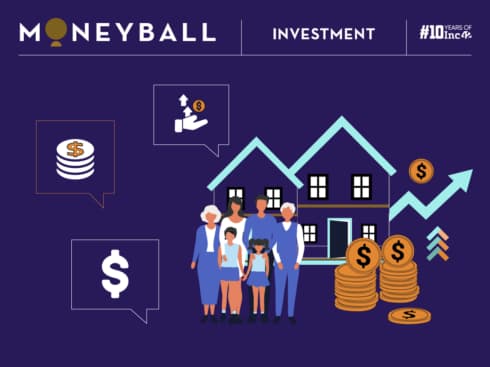





















 Ad-lite browsing experience
Ad-lite browsing experience